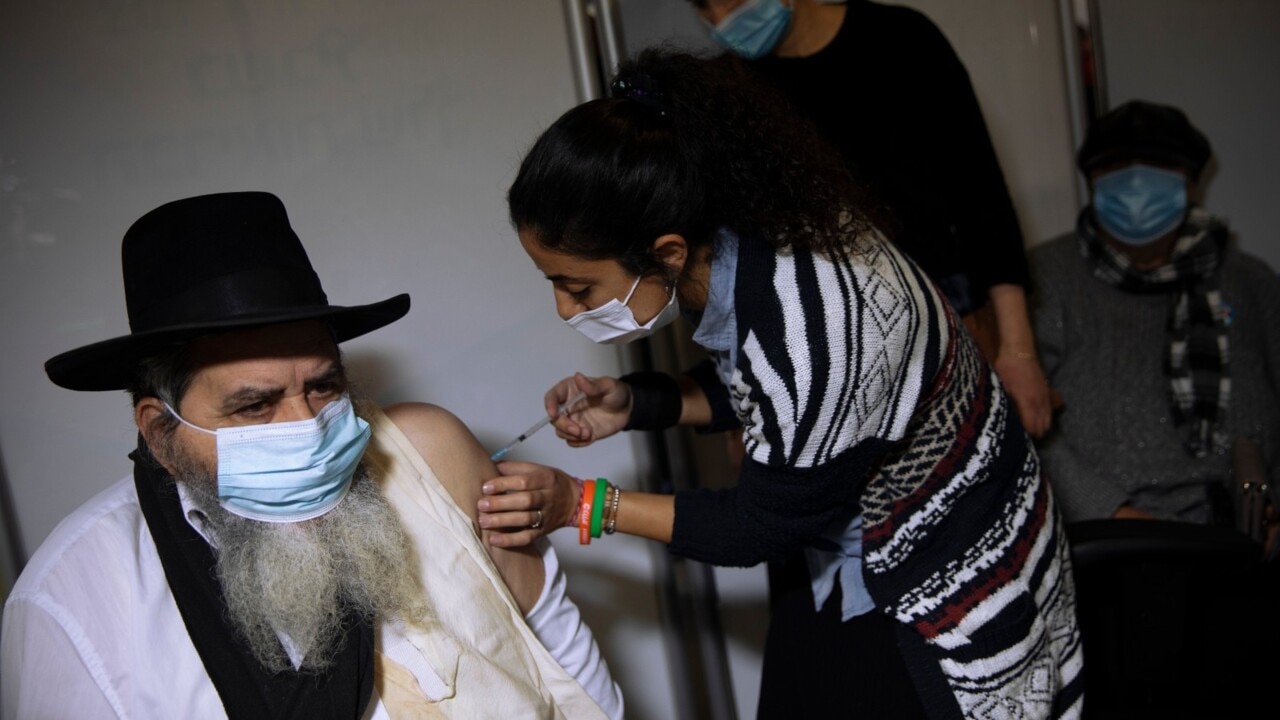World watches as Israel’s fast-tracked vaccination program delivers promising results
A small nation could be the “first in the world to get out of COVID” and it will have a huge influence on what happens next for the rest of us.

It paid a sky-high price to access one of the best coronavirus vaccines in the world and also agreed to share data on the accelerated rollout – but Israel’s expensive gamble seems to have paid off.
The small country in the Middle East was late joining the line for the Pfizer vaccine behind the US, Canada and Japan, according to The Times of Israel, but it still managed to gain fast-tracked access to millions of doses.
This was partly due to Israel paying a lot more for the vaccine – as much as double what the United States and United Kingdom signed up for per dose – but also because it agreed to share data on the results of the rollout with Pfizer.
“We didn’t quibble about the price,” Prime Minister Benjamin Netanyahu told reporters in January.
Mr Netanyahu also acknowledged that one of the selling points for Pfizer was that Israel “could serve as a world laboratory for herd immunity or something approaching herd immunity very quickly”.
Israel “can serve as a global test case” on the coronavirus vaccine and on reopening the economy, he said.
Two months since the vaccine began to be rolled out, experts are now watching closely to understand its effectiveness in the real world.
The program has been so successful that on Monday Mr Netanyahu’s government announced the reopening of some businesses.
“We’ll be the first in the world to get out [of COVID],” Mr Netanyahu told Israel’s Channel 12.
He encouraged 570,000 people aged over 50 who had not yet been vaccinated to get the jab, saying they would decide whether the current lockdown will be Israel’s last.
Our Best Shot is news.com.au’s campaign answering your questions about the COVID-19 vaccine rollout.
We’ll debunk myths about vaccines, answer your concerns about the jab and tell you when you can get the COVID-19 vaccine.
With a population almost double the size of Sydney’s, Israel has already provided the first of two jabs to more than four million people in just two months.
This has provided coverage to more than 40 per cent of its population of nine million.
Of these, more than 2.6 million have also received their second jab.
Although the number of vaccinations is not as high as other countries, Israel’s smaller population makes it easier to assess the impact of widespread vaccination because a higher proportion of the population is potentially protected.
Professor Allen Cheng, who leads the government’s Australian Technical Advisory Group on Immunisation, told news.com.au’s Samantha Maiden in late January that what happens in Israel over the next month or so will give experts an idea of how effective vaccines are at preventing transmission of the virus, which is crucial for understanding herd immunity.
Israel’s results are not directly transferable to Australia as it is using the Pfizer vaccine and Australians will mostly be given the AstraZeneca shot, but it could provide the biggest indication so far of the effectiveness of vaccines and the pathway back to normal.
So what is the data saying?
CAN YOU STILL SPREAD THE VIRUS?
So far there isn’t a clear answer on whether vaccinated people can still infect others but there is promising data suggesting vaccinations reduce viral load and this means people are less likely to infect others.
Analysis from DNA scientist Yaniv Erlich, who is MyHeritage’s chief science officer, and his colleague Ella Petter, found vaccinated people who still got sick with coronavirus had a viral load 1.5 times to 20 times lower than those who weren’t vaccinated.
This means they are less likely to pass on the virus to others even if they do get infected and provides some hope that herd immunity can be achieved.
“Whoever gets vaccinated not only protects himself but also his family, his neighbours, and his community. Therefore, it is important to get vaccinated,” Dr Erlich wrote in a Facebook post on February 8.
Anthony Fauci, the chief medical adviser to US President Joe Biden, also spruiked the vaccine’s ability to reduce people’s viral load, seen in studies from Israel and Spain.
“The vaccine is important not only for the health of the individual to protect them against infection and disease, including the variants … but it also has very important implications from a public health standpoint, for interfering and diminishing the dynamics of the outbreak,” he said on Wednesday.
RELATED: Australia’s ‘NASA-like’ COVID-19 vaccine plan

‘THE MAGIC HAS STARTED’
With any new vaccine there’s a risk that results seen in the trials won’t be replicated in the real world. This can happen for many reasons including the fact that people who sign up for trials tend to be healthier, more educated and open to new technology.
But so far the Pfizer’s results appear to be mirroring those experienced in the trial and it is protecting people from getting sick.
Eran Segal, a scientist at the Weizmann Institute, tweeted on February 2 that “the magic has started”.
He said in the previous two weeks there had been a 35 per cent drop in cases among people older than 60 (among the first to be vaccinated), as well as a 30 per cent drop in hospitalisations and 20 per cent drop in those critically ill.
Later tweets confirm the trend was continuing and that the age of those people being hospitalised seemed to be getting younger, as older age groups completed their vaccinations.
This week a study from the research institute of Israel’s largest healthcare provider Clalit Health Service, in partnership with Harvard University, revealed there was 94 per cent fewer symptomatic infections among those who were vaccinated, compared to those who weren’t.
There was also a 91 to 99 per cent drop in serious cases among all age groups, seven days after the second dose.
The Clalit results, along with analysis from other institutions, have given Israel’s government confidence that it can begin to re-open the country.
RELATED: COVID-19 Vaccine side effects you could have
OBSTACLES STILL NEED TO BE OVERCOME
However, there are concerns at the slowing rate of people willing to get vaccinated.
“At the beginning of the campaign we got used to inoculating between 100,000 and 120,000 people per day, and in the last few days we are barely reaching half of those figures,” Clalit manager of vaccinations Kalanit Kaye told the Times of Israel.
There are concerns anti-vaxxers are stoking fears within the country and it seems Israel may also serve as a test group for how to deal with those who are reluctant to get the jab.
Israel has now announced a “green badge” system to re-open certain venues to those who have received both of their jabs.
From Sunday, those who have the badge, which will also be given to those who have recovered from the virus, will be allowed into gyms, cultural events, houses of worship and hotels.
“We are moving ahead with the responsible reopening on the principle of ‘you’re vaccinated – you’re in’,” Defence Minister Benny Gantz said on Monday.
Other facilities, like malls and museums, will open to all citizens, with or without a green badge, under a so-called “purple code”, with crowd size limits and other restrictions that have applied through much of the pandemic.
Hagai Levine, a public health professor and researcher at Jerusalem’s Hebrew University, stressed Israel’s vaccination-dependent reopening plan required a “delicate balance” between public health needs and individual freedoms.
There is also “a right not to be vaccinated,” he told AFP.
“I think people should do it, but you cannot force them,” he added, noting that those who opt out inevitably risk being denied certain services.




